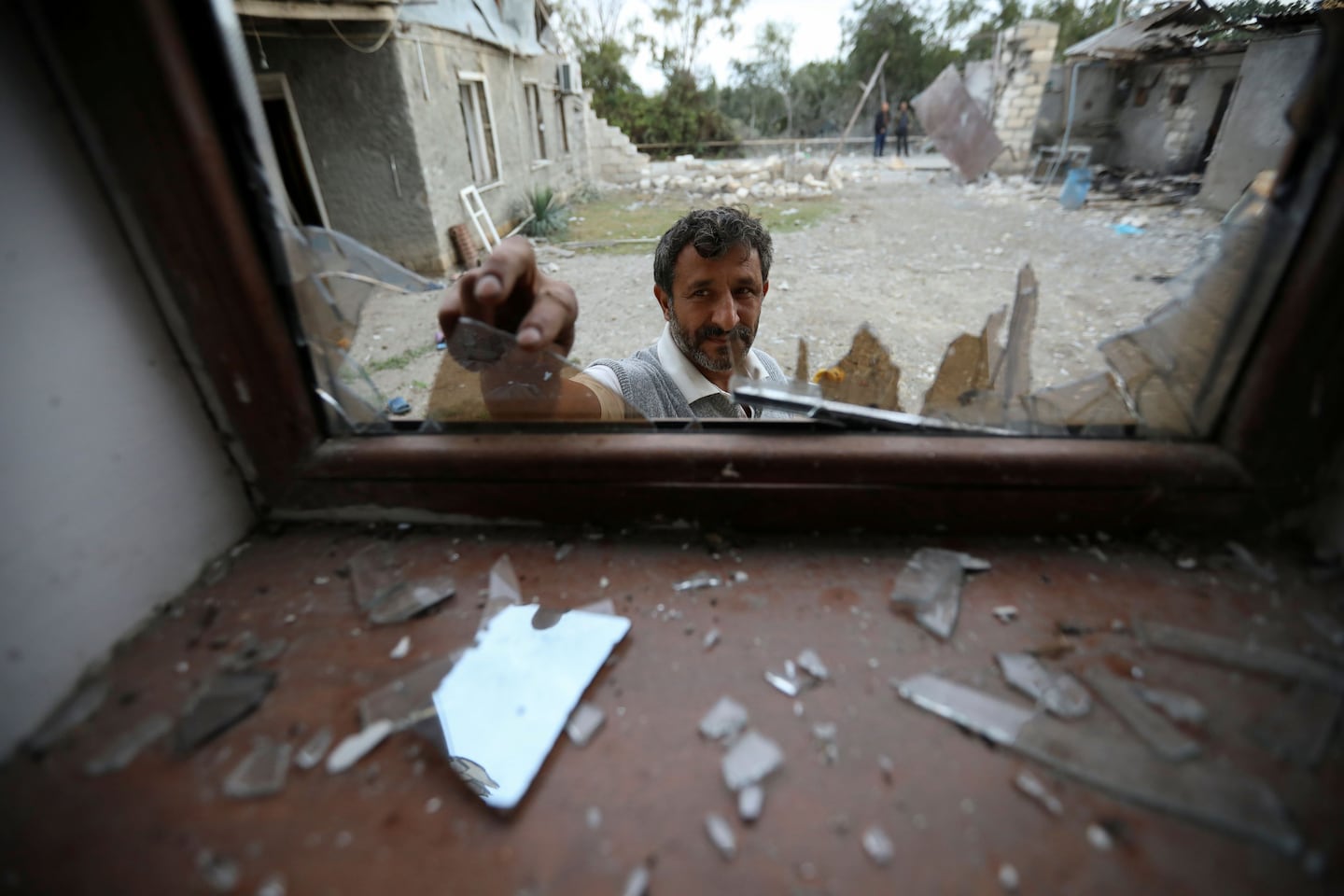The war in the Caucasus could turn into a regional calamity

At the heart of the crisis is the long-disputed region of Nagorno-Karabakh, which sits inside Azerbaijan’s borders but has a predominantly ethnic Armenian population and is controlled by factions with close ties to Armenia’s capital Yerevan, as well as a set of other territories that abut the region now emptied of their non-Armenian communities. Periodic skirmishes have broken out over the contested terrain, most recently in July. But the current fighting marks the worst round of violence since the early 1990s, when as many as 30,000 people were killed and thousands more displaced until a 1994 cease fire brought a fragile peace to the Caucasus.
Azerbaijani and Armenian officials blame each other for provoking the tensions and targeting civilians. On Sunday, authorities in Azerbaijan reported Armenian missile strikes hit densely-populated areas in Ganja, the country’s second largest city, killing at least one civilian and injuring four others. Arayik Harutyunyan, an Armenian leader in Nagorno-Karabakh, claimed his forces had fired rockets to “neutralize military targets” in the city, a characterization rejected by Azerbaijani officials.
Armenian officials said that Stepanakert, the main city in Nagorno-Karabakh, was under heavy bombardment from Azerbaijani forces. Journalists reported that many civilians were hiding in bomb shelters as the city weathered a sustained attack. Elin Suleymanov, Azerbaijan’s ambassador in Washington, told Today’s WorldView that his country’s forces were not targeting civilians and accused the Armenian side of indiscriminately bombing parts of his country.
The animosities are deep-seated, and leaders on both sides have rejected calls for talks. “We are facing possibly the most decisive moment in our millennia-old history,” Armenian Prime Minister Nikol Pashinyan said in an address to the nation on Saturday. “We all must dedicate ourselves to a singular goal: Victory.”
In an interview with Al Jazeera, Azerbaijani President Ilham Aliyev called for the withdrawal of Armenian forces from territories adjacent to Nagorno-Karabakh and accused Pashinyan’s government of undermining the already troubled internationally-mandated peace process involving both countries. The Armenian government “overestimated their so-called importance on [the] global arena, overestimated the possible international support to them and made very serious mistakes provoking us, attacking us and now they are suffering the very serious defeat,” Aliyev said.
Turkey’s staunch backing of Azerbaijan in the conflict has introduced a new edge to the tensions. “As Turkey, with all our means and with all our heart, we stand with fellow and brother Azerbaijan and we will continue to stand with it,” Turkish President Recep Tayyip Erdogan said Friday. “God willing, until Nagorno-Karabakh is liberated from invasion, this struggle will continue.”
“Azerbaijan has an organized 21st century fighting force,” said Suleymanov, pointing to the relative sophistication of the Azerbaijani military compared to their Armenian counterparts, who lack the economic resources and military hardware, including Israeli-made drones, made possible by Azerbaijan’s considerable wealth of oil and natural gas. Suleymanov added that “we don’t need additional fighters” who are “disorganized” and can’t even communicate with Azerbaijanis.
When asked about Turkey’s conspicuous boosting of Baku’s cause, Suleymanov claimed there was an “imbalance” in the outside perception of the crisis, which focuses more on the Turkish role than European or Russian support for Armenia. He also lamented attempts to cast the current escalation as a religious conflict, accusing Armenian officials who invoked their Christian faith as a rallying cry of “living in medieval times.”
The crisis spotlights the tangled geopolitics of the region. Azerbaijan is a secular nation notably close to Israel and occasionally at odds with Iran. This past week, ethnic Azerbaijanis living in northwestern Iran took to the streets in solidarity with their brethren across the border, in some instances clashing with security forces. Senior Iranian officials had to publicly deny allegations that they were sending assistance to Armenia and urged dialogue and an immediate cessation of hostilities.
For Moscow, the situation is even more delicate. It maintains deep ties with — and has sold weaponry to — both countries, but remains closer to Armenia. If the conflict spirals and spreads to flash points far from Nagorno-Karabakh, analysts suggest it raises the possibility of Russia and Turkey pitted in yet another proxy war after backing opposing sides in Syria and Libya. The Russian public, though, is increasingly disapproving of the Kremlin’s foreign adventures and that may limit Russia’s scope for action.
“We use our privileges to be a welcomed party by both Armenia and Azerbaijan,” said Sergey Markedonov, senior researcher at the government-run Moscow State Institute of International Relations, to the Wall Street Journal. “Turkey concentrates only on one side and it creates obstacles for Russia, because it pushes Azerbaijan to make a choice.”
The indifference of the West, particularly the United States, to ongoing strife and disagreements may be part of the problem. “Lack of international attention has sent a message to the parties that the conflict matters little outside the region,” noted the International Crisis Group. “In Baku, especially, this has exacerbated frustration with diplomacy.”
“The Americans have withdrawn from this issue,” said Thomas de Waal, a senior fellow at Carnegie Europe, to the Guardian. “If Trump has heard of Azerbaijan, it’s because it’s a place he wanted to build a Trump tower in.”
Read more:






